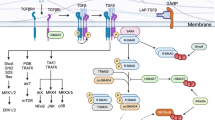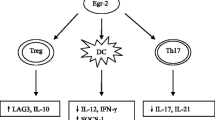Abstract
Transforming growth factor-β (TGF-β) is a key regulator of immune tolerance. In this paper, we will focus on T cells and natural killer (NK) cells, which are directly regulated by TGF-β in vivo. TGF-β controls T-cell activation and differentiation, and is involved in the suppressive function and generation of regulatory T cells. Recently, TGF-β has also been shown to directly inhibit NK cell activity. These studies demonstrate that TGF-β utilizes multiple mechanisms to ensure immune tolerance, which is critical in a variety of autoimmune and inflammatory disorders. We will also discuss recent advances on the role of TGF-β in immune-mediated diabetes, inflammatory bowel disease, arthritis, and systemic lupus erythematosus.
Similar content being viewed by others
References and Recommended Reading
Chang H, Brown CW, Matzuk MM: Genetic analysis of the mammalian transforming growth factor-beta superfamily. Endocr Rev 2002, 23:787–823.
Govinden R, Bhoola KD: Genealogy, expression, and cellular function of transforming growth factor-beta. Pharmacol Ther 2003, 98:257–265.
Li MO, Wan YY, Sanjabi S, et al.: Transforming growth factor-beta regulation of immune responses. Annu Rev Immunol 2006, In press.
Shull,MM, Ormsby,I, Kier,AB, et al.: Targeted disruption of the mouse transforming growth factor-beta 1 gene results in multifocal inflammatory disease. Nature 1992, 359:693–639.
Kulkarni,AB, Huh,CG, Becker,D, et al.: Transforming growth factor beta 1 null mutation in mice causes excessive inf lammator y response and early death. Proc Natl Acad Sci U S A 1993, 90:770–774.
Dang,H, Geiser,AG, Letterio,JJ, et al.: SLE-like autoantibodies and Sjogren’s syndrome-like lymphoproliferation in TGF-beta knockout mice. J Immunol 1995, 155:3205–3212.
Yaswen,L, Kulkarni,AB, Fredrickson,T, et al.: Autoimmune manifestations in the transforming growth factor-beta 1 knockout mouse. Blood 1996, 87:1439–1445.
Letterio,JJ, Geiser,AG, Kulkarni,AB, et al.: Autoimmunity associated with TGF-beta1-deflciency in mice is dependent on MHC class II antigen expression. J Clin Invest 1996, 98:2109–2119.
Kobayashi,S, Yoshida,K, Ward,JM, et al.: Beta 2-microglobulin- de.cient background ameliorates lethal phenotype of the TGF-beta 1 null mouse. J Immunol 1999, 163:4013–4019.
Gorelik,L, Flavell,RA: Abrogation of TGFbeta signaling in T cells leads to spontaneous T cell differentiation and autoimmune disease. Immunity 2000, 12:171–81. Together with Lucas et al. [11], these studies demonstrate that TGF-β directly regulates T cell tolerance and homeostasis in vivo.
Lucas,PJ, Kim,SJ, Melby,SJ, Gress,RE: Disruption of T cell homeostasis in mice expressing a T cell-specific dominant negative transforming growth factor beta II receptor. J Exp Med 2000, 191:1187–1196. Together with Gorelik et al. [10], these studies demonstrate that TGF-γ directly regulates T cell tolerance and homeostasis in vivo.
Leveen,P, Larsson,J, Ehinger,M, et al.: Induced disruption of the transforming growth factor beta type II receptor gene in mice causes a lethal inflammatory disorder that is transplantable. Blood 2002, 100:560–568.
Chytil,A, Magnuson,MA, Wright,CV, Moses,HL: Conditional inactivation of the TGF-beta type II receptor using Cre: Lox. Genesis 2002, 32:73–75.
Gorelik,L, Flavell,RA: Transforming growth factor-beta in T-cell biology. Nat Rev Immunol 2002, 2:46–53.
Gorelik,L, Fields,PE, Flavell,RA: Cutting edge: TGF-beta inhibits Th type 2 development through inhibition of GATA-3 expression. J Immunol 2000, 165:4773–4777.
Heath,VL, Murphy,EE, Crain,C, et al.: TGF-beta1 downregulates Th2 development and results in decreased IL-4-induced STAT6 activation and GATA-3 expression. Eur J Immunol 2000, 30:2639–2649.
Chen,CH, Seguin-Devaux,C, Burke,NA, et al.: Transforming growth factor beta blocks Tec kinase phosphorylation, Ca2+ influx, and NFATc translocation causing inhibition of T cell differentiation. J Exp Med 2003, 197:1689–1699. This study demonstrates that TGF-β interferes with TCR/CD28 signaling to inhibit T cell differentiation in CD4+ T cells.
Gorelik,L, Constant,S, Flavell,R A: Mechanism of transforming growth factor beta-induced inhibition of T helper type 1 differentiation. J Exp Med 2002, 195:1499–1505.
Lin,JT, Martin,SL, Xia,L, Gorham,JD: TGF-beta1 uses distinct mechanisms to inhibit IFN-gamma expression in CD4+ T cells at priming and at recall: differential involvement of Stat4 and T-bet. J Immunol 2005, 174:5950–5958.
Thomas,DA, Massague,J: TGF-beta directly targets cytotoxic T cell functions during tumor evasion of immune surveillance. Cancer Cell 2005, 8:369–380. This study reveals that the TGF-β/Smad pathway inhibits cytotoxic gene expression through direct promoter suppression in CD8+ T cells.
Sakaguchi,S, Sakaguchi,N, Asano,M, et al.: Immunologic self-tolerance maintained by activated T cells expressing IL-2 receptor alpha-chains (CD25). Breakdown of a single mechanism of self-tolerance causes various autoimmune diseases. J Immunol 1995, 155:1151–1164.
Shevach,EM: CD4+ CD25+ suppressor T cells: more questions than answers. Nat Rev Immunol 2002, 2:389–400.
Fontenot,JD, Rasmussen,JP, Williams,LM, et al.: Regulatory T cell lineage specification by the forkhead transcription factor foxp3. Immunity 2005, 22:329–341. This study provided the definitive genetic evidence that transcription factor FoxP3 controls the physiology of regulatory T cells.
Sakaguchi,S: Naturally arising Foxp3-expressing CD25+CD4+ regulatory T cells in immunological tolerance to self and non-self. Nat Immunol 2005, 6:345–352.
Schwartz,RH: Natural regulatory T cells and self-tolerance. Nat Immunol 2005, 6:327–330.
von Boehmer,H: Mechanisms of suppression by suppressor T cells. Nat Immunol 2005, 6:338–344.
Fantini,MC, Becker,C, Monteleone,G, et al.: Cutting edge: TGF-beta induces a regulatory phenotype in CD4+CD25- T cells through Foxp3 induction and down-regulation of Smad7. J Immunol 2004, 172:5149–5153.
Nakamura,K, Kitani,A, Strober,W: Cell contactdependent immunosuppression by CD4(+)CD25(+) regulator y T cells is mediated by cell surface-bound transforming growth factor beta. J Exp Med 2001, 194:629–644.
Piccirillo,CA, Letterio,JJ, Thornton,AM, et al.:CD4(+)CD25(+) regulatory T cells can mediate suppressor function in the absence of transforming growth factor beta1 production and responsiveness. J Exp Med 2002, 196:237–246.
Powrie,F, Carlino,J, Leach,MW, et al.: A critical role for transforming growth factor-beta but not interleukin 4 in the suppression of T helper type 1-mediated colitis by CD45RB(low) CD4+ T cells. J Exp Med 1996, 183:2669–2774.
Kullberg,MC, Hay,V, Cheever,AW, et al.: TGF-beta1 production by CD4+ CD25+ regulatory T cells is not essential for suppression of intestinal in.ammation. Eur J Immunol 2005, 35:2886–2895.
Mamura,M, Lee,W, Sullivan,TJ, et al.: CD28 disruption exacerbates in.ammation in Tgf-beta1-/-mice: in vivo suppression by CD4+CD25+ regulatory T cells independent of autocrine TGF-beta1. Blood 2004, 103:4594–4601.
Fahlen,L, Read,S, Gorelik,L, et al.: T cells that cannot respond to TGF-[beta] escape control by CD4+CD25+ regulatory T cells. J Exp Med 2005, 201:737–746.
Nakamura,K, Kitani,A, Fuss,I, et al.: TGF-beta 1 plays an important role in the mechanism of CD4+CD25+ regulatory T cell activity in both humans and mice. J Immunol 2004, 172:834–842.
Horwitz,DA, Zheng,SG, Gray,JD: The role of the combination of IL-2 and TGF-beta or IL-10 in the generation and function of CD4+ CD25+ and CD8+ regulatory T cell subsets. J Leukoc Biol 2003, 74:471–478.
Roncarolo,MG, Bacchetta,R, Bordignon,C, et al.: Type 1 T regulator y cells. Immunol Rev 2001, 182:68–79.
Battaglia,M, Gianfrani,C, Gregori,S, Roncarolo,MG: IL-10- producing T regulatory type 1 cells and oral tolerance. Ann N Y Acad Sci 2004, 1029:142–153.
Levings,MK, Sangregorio,R, Sartirana,C, et al.: Human CD25+CD4+ T suppressor cell clones produce transforming growth factor beta, but not interleukin 10, and are distinct from type 1 T regulatory cells. J Exp Med 2002, 196:1335–1346.
Zheng,SG, Wang,JH, Gray,JD, et al.: Natural and induced CD4+CD25+ cells educate CD4+CD25- cells to develop suppressive activity: the role of IL-2, TGF-beta, and IL-10. J Immunol 2004, 172:5213–5221.
Zheng,SG, Gray,JD, Ohtsuka,K, et al.: Generation ex vivo of TGF-beta-producing regulatory T cells from CD4+CD25- precursors. J Immunol 2002, 169:4183–4189.
Wan,YY, Flavell,RA: Identifying Foxp3-expressing suppressor T cells with a bicistronic reporter. Proc Natl Acad Sci U S A 2005, 102:5126–5131. This study demonstrates that TGF-β is able to induce de novo FoxP3 expression and thus the generation of regulatory T cells.
Peng,Y, Laouar,Y, Li,MO, et al.: TGF-beta regulates in vivo expansion of Foxp3-expressing CD4+CD25+ regulatory T cells responsible for protection against diabetes. Proc Natl Acad Sci U S A 2004, 101:4572–4577.
Chen,W, Jin,W, Hardegen,N, et al.: Conversion of peripheral CD4+CD25- naive T cells to CD4+CD25+ regulatory T cells by TGF-beta induction of transcription factor Foxp3. J Exp Med 2003, 198:1875–1886.
Huber,S, Schramm,C, Lehr,HA, et al.: Cutting edge: TGFbeta signaling is required for the in vivo expansion and immunosuppressive capacity of regulatory CD4+CD25+ T cells. J Immunol 2004, 173:6526–6531.
Marie,JC, Letterio,JJ, Gavin,M, Rudensky,AY: TGF-ta1 maintains suppressor function and Foxp3 expression in CD4+CD25+ regulatory T cells. J Exp Med 2005, 201:1061–1067.
Lanier,LL: NK cell recognition. Annu Rev Immunol 2005, 23:225–274.
Laouar,Y, Sutterwala,FS, Gorelik,L, Flavell,RA: Transforming growth factor-beta controls T helper type 1 cell development through regulation of natural killer cell interferon-gamma. Nat Immunol 2005, 6:600–607. This is the first study showing in vivo that TGF-β controls NK cell homeostasis and IFN-γ production.
Castriconi,R, Cantoni,C, Della,Chiesa M, et al.: Transforming growth factor beta 1 inhibits expression of NKp30 and NKG2D receptors: consequences for the NK-mediated killing of dendritic cells. Proc Natl Acad Sci U S A 2003, 100:4120–4125.
Ghiringhelli,F, Menard,C, Terme,M, et al.: CD4+CD25+ regulatory T cells inhibit natural killer cell functions in a transforming growth factor-beta-dependent manner. J Exp Med 2005, 202:1075–1085.
Esplugues,E, Sancho,D, Vega-Ramos,J, et al.: Enhanced antitumor immunity in mice deficient in CD69. J Exp Med 2003, 197:1093–1106. This is the first study to demonstrate a role for CD69 in negative regulation of immune responses in correlation with TGF-β expression.
Esplugues,E, Vega-Ramos,J, Cartoixa,D, et al.: Induction of tumor NK-cell immunity by anti-CD69 antibody therapy. Blood 2005, 105:4399–4406.
Gregg,RK, Jain,R, Schoenleber,SJ, et al.: A sudden decline in active membrane-bound TGF-beta impairs both T regulatory cell function and protection against autoimmune diabetes. J Immunol 2004, 173:7308–7316.
Pop,SM, Wong,CP, Culton,DA, et al.: Single cell analysis shows decreasing FoxP3 and TGFbeta1 coexpressing CD4+CD25+ regulatory T cells during autoimmune diabetes. J Exp Med 2005, 201:1333–1346.
Belghith,M, Bluestone,JA, Barriot,S, et al.: TGF-beta-dependent mechanisms mediate restoration of self-tolerance induced by antibodies to CD3 in overt autoimmune diabetes. Nat Med 2003, 9:1202–1208. This study demonstrates for the.rst time that treatment of immunemediated diabetes with modi.ed anti-CD3 is TGF-β dependent.
Chatenoud,L: Anti-CD3 antibodies: towards clinical antigen-speci.c immunomodulation. Curr Opin Pharmacol 2004, 4:403–407.
Bisikirska,B, Colgan,J, Luban,J, et al.: TCR stimulation with modi.ed anti-CD3 mAb expands CD8+ T cell population and induces CD8+CD25+ Tregs. J Clin Invest 2005, 115:2904–2913.
Herold,KC, Hagopian,W, Auger,JA, et al.: Anti-CD3 monoclonal antibody in new-onset type 1 diabetes mellitus. N Engl J Med 2002, 346:1692–1698.
Fantini MC, Becker C, Tubbe I, et al.: TGF-ta induced Foxp3+ regulatory T cells suppress Th1-mediated experimental colitis. Gut 2005, In press.
Monteleone,G, Kumberova,A, Croft,NM, et al.: Blocking Smad7 restores TGF-beta1 signaling in chronic inf lammator y bowel disease. J Clin Invest 2001, 108:601–609. This study shows that TGF-β signaling is inhibited at in.ammatory sites in in.ammatory bowel disease.
Sancho,D, Gomez,M, Viedma,F, et al.: CD69 downregulates autoimmune reactivity through active transforming growth factor-beta production in collagen-induced arthritis. J Clin Invest 2003, 112:872–882.
Schramm,C, Kriegsmann,J, Protschka,M, et al.: Susceptibility to collagen-induced arthritis is modulated by TGFbeta responsiveness of T cells. Arthritis Res Ther 2004, 6:R114-R119.
Kim,HY, Kim,HJ, Min,HS, et al.: NKT cells promote antibody-induced joint in.ammation by suppressing transforming growth factor beta1 production. J Exp Med 2005, 201:41–47.
Ohtsuka,K, Gray,JD, Stimmler,MM, et al.: Decreased production of TGF-beta by lymphocytes from patients with systemic lupus erythematosus. J Immunol 1998, 160:2539–2545.
Kang,HK, Michaels,MA, Berner,BR, Datta,SK: Very low-dose tolerance with nucleosomal peptides controls lupus and induces potent regulatory T cell subsets. J Immunol 2005, 174:3247–3255.
Kaliyaperumal,A, Mohan,C, Wu,W, Datta,SK: Nucleosomal peptide epitopes for nephritis-inducing T helper cells of murine lupus. J Exp Med 1996, 183:2459–2469.
Zheng,SG, Wang,JH, Koss,MN, et al.: CD4+ and CD8+ regulatory T cells generated ex vivo with IL-2 and TGF-beta suppress a stimulatory graft-versus-host disease with a lupus-like syndrome. J Immunol 2004, 172:1531–1539.
Guo,H, Leung,JC, Chan,LY, et al.: Modulation of intrapulmonary TGF-beta expression by mycophenolate mofetil in lupus prone MRL/lpr mice. Lupus 2005, 14:583–592.
Author information
Authors and Affiliations
Corresponding author
Rights and permissions
About this article
Cite this article
Kriegel, M.A., Li, M.O., Sanjabi, S. et al. Transforming growth factor-β: Recent advances on its role in immune tolerance. Curr Rheumatol Rep 8, 138–144 (2006). https://doi.org/10.1007/s11926-006-0054-y
Issue Date:
DOI: https://doi.org/10.1007/s11926-006-0054-y




